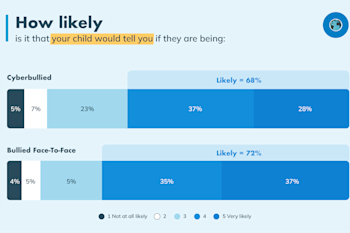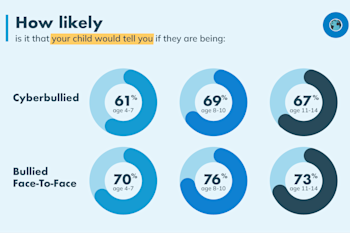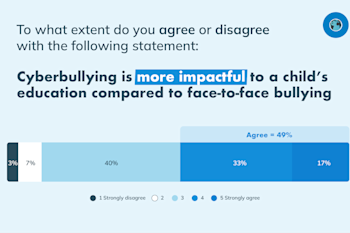Understanding cyberbullying facts and statistics

The likelihood of meeting someone that doesn’t use the internet in 2023 is small. According to Statista, a global data and business intelligence platform, there are 5.19 billion internet users worldwide, amounting to over 64% of total global population. With the increased use of internet and social media usage comes an unfortunate risk: cyberbullying.
Keeping up to date on cyberbullying facts and statistics can make all the difference when it comes to keeping children safe online. By keeping well informed, and helping children understand the importance of online safety we stand a better chance of navigating the online world with resilience and empathy.
Below we’ve compiled 12 cyberbullying facts and statistics from various reports to help keep you informed:
12 cyberbullying facts and statistics
27% of children between the ages of 8-15 who use some form of social media have experienced cyberbullying. [1]
In a UK survey, 74% of parents identified classmates as the main cyberbullies of children they knew. [2]
One in five children in 30 countries have skipped school due to cyberbullying. [3]
71% of children between 5-15 have seen hateful content online. [1]
In the UK, 17% of parents report that their child has been a victim of cyberbullying. [4]
One in five 9-12 year olds has either experienced, witnessed or participated in cyberbullying. [5]
Only 11% of teenagers have discussed a cyberbullying incident with parents. [6]
29% of teenagers do nothing when they experience cyberbullying. [5]
Children and young individuals under the age of 25 who are victims of cyberbullying are over twice as likely to engage in self-harm. [7]
Less than three in ten parents of 3-17 year old children believed the benefits of their child using social media, messaging and video sharing apps outweighed the risks. [1]
One study found that 9 in 10 people experienced bullying while playing video games online. [8]
66% of children between 10-15 say they did not report cyberbullying because they did not think it was important. [9]
Our investigations into cyberbullying and face-to-face bullying
We wanted to find out how parents feel about cyberbullying and whether they believe their children would report cyberbullying.
So we surveyed parents to find out how likely they believe it would be for their child to tell them if they were being cyberbullied. We also asked how likely they believe it would be for their child to tell them if they were being bullied in person for comparison.
In response 65% of parents believed their child would tell them if they were being cyberbullied. 72% of parents believed their child would tell them if they were being bullied in person.

In our survey we learned that parents of younger children aged 4-7 believe their child is less likely to report cyberbullying than in-person bullying, with a comparison of 61% against 70%.
Parents of older children aged 11-14 believe that children are likely to report cyberbullying with 67%, and even more likely to report in person bullying with 73%.
Notably parents of children aged 8-10 believe their children are even more likely to report both cyberbullying and in person bullying, with 69% for cyberbullying and 76% for face-to-face bullying. This suggests as children get older parents worry they’re less likely to report bullying.

Finally we asked parents to what extent they agree or disagree that cyberbullying is more impactful to a child’s education than face-to-face bullying. 49% of parents agreed that cyberbullying has a greater impact on a child’s education than face-to-face bullying.

What we have learned from the cyberbullying facts and statistics
We’ve learned a few things from our exploration of cyberbullying, and the data highlights the importance of addressing the issue. Here are some of our key learnings:
An overwhelming number of children aged 8-17 have experienced online bullying, which is now becoming more common than face-to-face bullying.
Children in the UK and many other countries have skipped school in response to cyberbullying.
Classmates often emerge as the main perpetrators of cyberbullying.
Sadly only a small number of teenagers feel comfortable discussing cyberbullying incidents with their parents, and some teens do nothing at all when faced with cyberbullying.
Generally parents believe children are more likely to report face-to-face bullying than cyberbullying.
Seeing the effects that online bullying can have on children in school is troubling. And children that use social media or play video games online become more likely to encounter cyberbullying. So it’s important to talk to children about how to deal with cyberbullying and make it clear that you’re there to take it seriously and support them.
Reflecting on our findings it’s clear that we all need to play a part in ensuring online safety. We remain committed to keeping our members safe online and providing parents and carers with the information they need to support their children if they experience cyberbullying.
Through informed and open conversations about cyberbullying and how it can impact children’s learning and mental health, we can protect their wellbeing while they’re online.
Cancel anytime
No joining fee
In centre or online
Memberships to suit you
Cancel anytime
No joining fee
In centre or online
Memberships to suit you
Cancel anytime
No joining fee
In centre or online
Memberships to suit you




